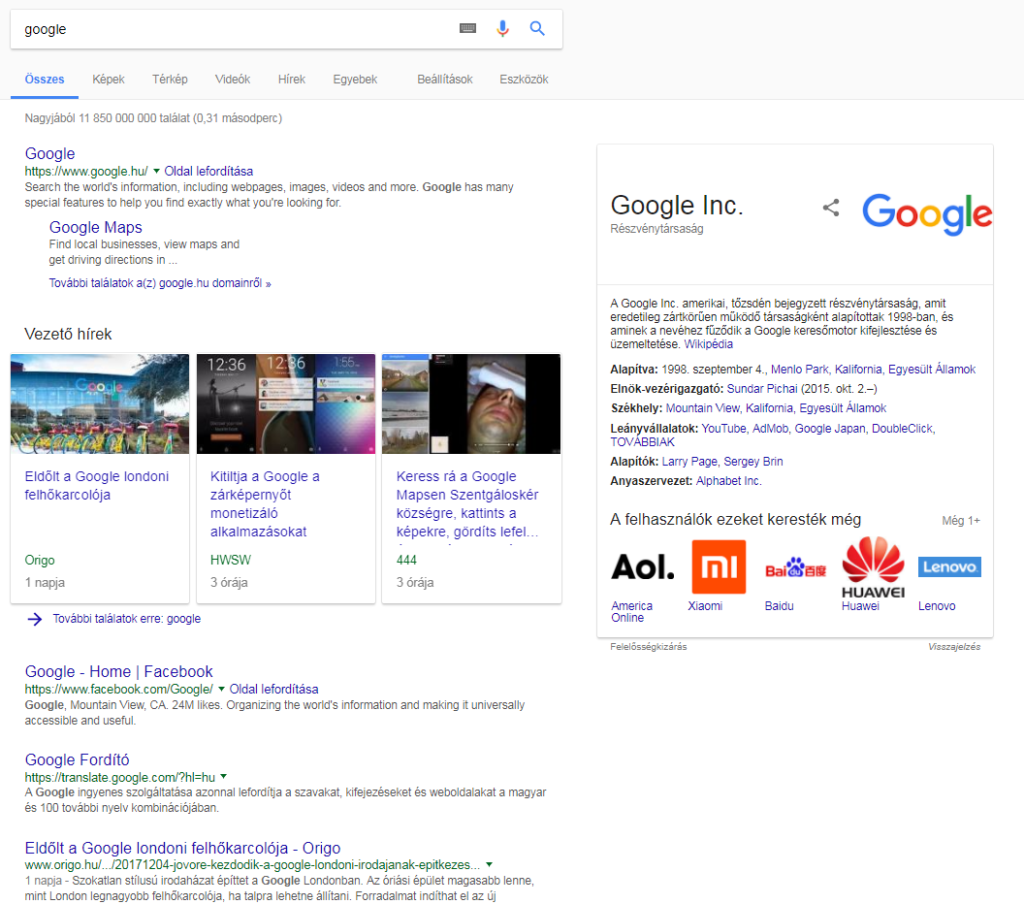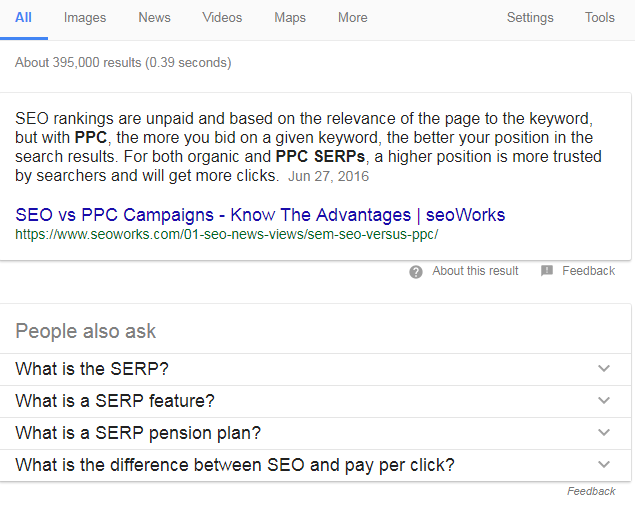8 SEO trends that will dominate in 2018 | Weboptim
It looks like 2018 will be an exciting year from an SEO perspective. Let's see what next year brings!
SEO is a complex science because of Google's 200+ factor algorithm. The biggest challenge is that the rules of the game are constantly changing.
As search engines strive to improve the quality of search results, some ranking factors change, others are forgotten, or completely new ones appear out of nowhere. To make sure everyone is prepared for the year ahead, here's a list of the most important trends and how to prepare for them.
1. The rise of SERP functions
Are you sure that the first position is the best way to get more traffic? Let's think again. The ever evolving SERP features (local results, knowledge graph, rich snippet) are distracting searchers and taking their attention away from traditional text results.
And that's only good when you consider what Google SERPs have been through so far.
From 10 simple blue links, we have moved on to something much more complex:

What can we do?
To improve SERP features, it is key to monitor these features and pay attention to what features appear for your keywords and whether they are diverting traffic.
The data can be used to analyse the potential of these features. Can we use local data? Can we get a highlighted snippet for the query? What about the knowledge graph?
2. Structured data
Structured data is a form of HTML formatting that uses a specific set of words and tells search engines how to interpret - and display - the content.
Google has never officially confirmed whether structured data is a ranking factor - this in itself is unlikely.
So what is it good for?
Structured data can be used to improve search lists in many ways: think of the Knowledge graph or rich snippets. The latter can increase click-through rates by up to 30%.
As search results become more varied, we can't ignore the opportunity to stand out, even ahead of the competition.

What can we do?
Let's go and do it. There are several structured data formats, but most SEOs stick to schema.org.
3. The fastest survives
Speed is important. Not just a ranking factor, it is also a very important UX (user experience) factor. UX influences the ranking.
But how fast is fast exactly? Google expects pages to load in 3 seconds.

What can we do?
Take the Google Page Speed test. For each problematic factor, it describes how to improve it.
4. Relevance 2.0
It's getting harder to convince Google that our content is good. The search giant assesses the quality of content in a number of ways, one of which is latent semantic indexing. Using billions of pages and phrases, Google learns which terms are related and sets expectations for the terms that appear in a given context. This helps it to decide whether a piece of content is comprehensive or not.
With RankBrain, Google can further analyse the best performing search queries (according to Google's user satisfaction index) and look for similarities between them.
What can we do?
How can we make sure our content is comprehensive? By crawling the top-ranked sites and looking for their earned features, just like RankBrain does. Obviously this is not possible manually for each search term.
5. Voice search is the real deal
Are we sceptical about voice searches? According to Google research, 55% of teens and 40% of adults use this feature every day, and this proportion is growing faster. Voice search is giving birth to a whole new keyword search routine: users are using normal, conversational sentences instead of sometimes strange-sounding search queries.
6. Mobile is unimaginably big
With the growth of voice searches, more than half of Google searches come from mobile devices. With the first mobile index coming up and mobile-friendliness becoming an increasingly important ranking factor, we can no longer afford to ignore mobile SEO.

What can we do?
Check that your website is mobile-friendly. If we get a negative answer, we should make it mobile-friendly, otherwise we could lose valuable visitors.
7. Unlinked links
Links have been a trust factor for search engines for years - SEO professionals have spent most of their time optimising (and manipulating) them. But times are changing, and now mentions without links are becoming off page signals with equal weight.
What can we do?
In addition to link checking software, use tracking tools to track brand and product mentions.
8. More personalised SERPs
Personalised search results are based not only on traditional ranking factors, but also on information about the user (location, search history, interests).
In 2011, an experiment showed that more than 50% of Google searches were personalised, and this number has been rising ever since. Google, Bing and Yahoo all personalise search results in multiple ways.
What can we do?
Let's not panic. Personalisation is not something to be done about. When a user first searches for a keyword, we should do everything we can to appear in the top search results. When a searcher clicks on a result, we become preferred and subsequent searches are likely to include our site in the top results.

Some more important things for 2018:
Link building
Link building is not expected to disappear in 2018, but the creation of the strategy itself will be more important. There is no need to target new link acquisition unless they add value and help build your brand.
The best links are not always from the most popular sites, but it is still important to look for sites that are relevant to your industry.
A successful SEO strategy in 2018 is shifting towards relationship building, which helps brands build more effective relationships over the long term. It will be a challenge to address guest blogs and how to include them in your link building strategy without damaging your brand reputation.
UX
User experience will be even more important in 2018. Google has made it clear that the focus is on the user and that websites must provide a good user experience for visitors.
A good UX increases the chances of user engagement during a visit.
The first step is to check the speed, readability and navigation structure of the website.
A closer look at visitors' browsing habits provides useful information. For example, if visitors coming directly from searches spend only 30 seconds on the site, the content or user experience is probably poor.
In addition, as more and more people use mobile devices, there is an increasing need to provide an excellent user experience on all devices.
Featured snippet and quick answers
According to surveys, nearly 30% of Google search queries have one. The popularity of the featured snippet has increased competition among companies who wanted to appear in the first position.
Lists, tables and graphs are popular, but it's also useful to create content in a question-and-answer format, making it easier for Google to fill in the right content and display it as a featured snippet.
An easy way to reach the top of the SERP is to create content that serves as a quick response. A Google Answer Box is a type of featured code snippet designed to provide a more engaging way to answer a question.
It usually follows a "how" or "what" structure, and Google aims to organise search intent in a way that is useful to search results. It was observed that the results displayed in the answer boxes show a CTR of 32%.

AI and machine learning
Artificial intelligence and machine learning have already changed the way search results are ranked. Machine learning can also make it easier to conduct searches, helping users to find results that fit the context.
This will lead to a more personalised experience, while voice search and the rise of digital assistants provide an ideal platform for developing artificial intelligence and successful SEO strategies.
2018 looks set to be an interesting year. Traditional SEO techniques are still effective, but there are a number of trends coming that could significantly change search engine optimization practices.
What's worth understanding is that SEO is changing, and getting in the top positions is no longer the ultimate goal. As search engines evolve, there are more and more opportunities to increase search traffic without necessarily focusing on organic SERPs.
Increases in featured snippets, PPC, voice search and local SEO often show better results than organic rankings. It is therefore useful to keep up with successful SEO strategies in the coming year.
Source: searchengineland.com , searchenginewatch.com